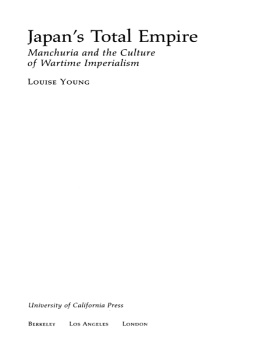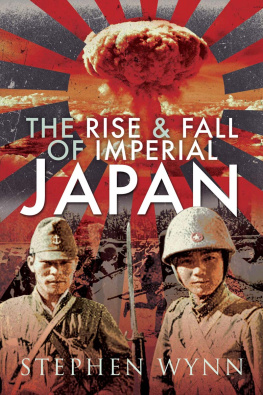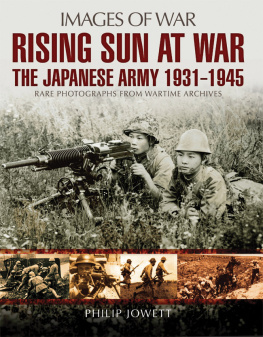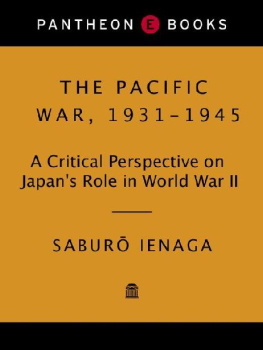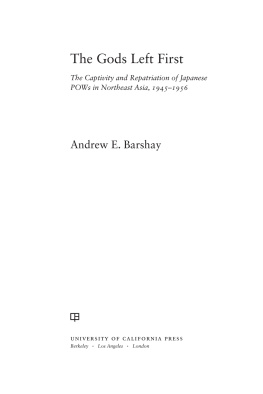First published 2007 by Transaction Publishers
Published 2017 by Routledge
2 Park Square, Milton Park, Abingdon, Oxon OX14 4RN
711 Third Avenue, New York, NY 10017, USA
Routledge is an imprint of the Taylor & Francis Group, an informa business
Copyright 2007 by Taylor & Francis.
All rights reserved. No part of this book may be reprinted or reproduced or utilised in any form or by any electronic, mechanical, or other means, now known or hereafter invented, including photocopying and recording, or in any information storage or retrieval system, without permission in writing from the publishers.
Notice:
Product or corporate names may be trademarks or registered trademarks, and are used only for identification and explanation without intent to infringe.
Library of Congress Catalog Number: 2006053010
Library of Congress Cataloging-in-Publication Data
Gruhl, Werner.
Imperial Japans World War Two, 1931-1945 / Werner Gruhl.
p. cm.
Includes bibliographica1 references and index.
ISBN-l3: 978-0-7658-0352-8 (a1k. paper)
ISBN-l0: 0-7658-0352-6 (a1k. paper)
1. World War, 1939-1945Japan. 2. Sino-Japanese War, 1937-1945.
3. Sino-Japanese Conflict, 1931-1933. 4. World War, 1939-1945
AtrocitiesAsia. 5. Sino-Japanese War, 1937-1945Atrocities.
D767.G78 2007
940.5352dc22
2006053010
ISBN 13: 978-1-4128-1104-0 (pbk)
ISBN 13: 978-0-7658-0352-8 (hbk)
This endeavor is dedicated to the memory of Iris Chang. Her book, The Rape of Nanking, began the long overdue task of educating Americans that World War II had as much to do with Nanking as with Pearl Harbor and Hiroshima.
Imperial Japans World War Two 1931-1945, is a product of both my lifetime interest in history and the discovery that a large part of the World War II history is missing in the American remembrance of that global tragedy. For instance, how many are aware that half of the worlds population was deeply engaged in the Asian-Pacific Theater of war? How many appreciate the fact that about 99 percent of all Allied deaths in that theater were Asians, with 1 percent being Americans and other Westerners?
My interest in history, the human consequences, and its analysis started when I was old enough to appreciate that my father and uncle were both in the First World War. The day-to-day news of the Second World War was a large part of my growing up experience. Much of my free time was devoted to poring over magazines and books as Japan invaded Asia and Germany invaded Europe. I can remember hearing Hitler rant on the radio from Germany about his war aims. Another memory was of listening to radio news about the Japanese army attack into China. I recall my family asking why America was selling Japan scrap metal used to make arms and munitions to bomb and invade China. Then came the shock of Japans surprise attack on Pearl Harbor. My home at the time was in Oakland, California, and I witnessed the excitement and resolve of Americans living on the coast. Here we were, the closest continental Americans to Pearl Harbor, wondering about a possible threat to our coast from the Japanese navy.
After this came the personal war experience in Korea: I saw war and the effects on the Asian peoples first hand as a U.S. Marine in the fighting. Later, after graduating from the University of Wisconsin, I was an Army officer during the Cold War and was responsible for the assembly, launch, and control of nuclear-tipped missiles. Incidentally, returning to civilian life, I became a strong supporter of the control and elimination of nuclear weapons and supporter of the United Nations.
History continued to be a large part of my life at NASA in Washington, D.C. My responsibilities required in-depth study, analysis, and organization of spacecraft program history, including statistics, to effectively assess the challenges presented by new spacecraft designs and the resources necessary to carry them out.
History involves me in many related organizations and in tours of World War I and World War II battlefields in Europe and Russia. This lifelong interest and my twenty-seven-year NASA career honed my skills in research, investigation, and analysis of history and the lessons that may be learned.
I was propelled into undertaking this book by the disturbing realization of how little most Americans knew about Imperial Japans aggression in World War II, 1931-1945, against the peoples of China and the rest of East Asia. Considering Americas significant geopolitical interest in the region, it seems to me that it is important to have some comprehension of the very real and long-term pain caused by the total war Japan inflicted on its Asian neighbors. The often-bitter memory haunts the regions relations with Japan today as it would Americans, had we suffered as much.
Imperial Japans World War Two is an attempt to address this neglected remembrance. This has been a ten-year, almost full time, retirement endeavor. It has included learning trips to China, Japan, including Hiroshima, and to Thailand, with an exploration hike on the Thailand-Burma World War II Death Railway.
This book is a survey and synthesis of literature, documentation, authors interviews, and statistical data that provides an overview analysis, but not a detailed chronicle, of the fourteen-year war and its victims. It provides the reader an understanding of Japans war for empire in the World War II period and what it meant in death and suffering particularly to most of the invaded people of East Asia and the surrounding ocean islands. For the first time a comprehensive statistical analysis is incorporated with a historical study.
It examines how the United States objection to aggression that began in 1931, led to the attack on Pearl Harbor in 1941 and thence to Hiroshima in 1945. Chinas particular political and economic plight and contribution to Allied victory are explored. Japans responsibility for the war and war crimes are analyzed. Finally, the book places the atomic bomb issue, as it should be, in the context of the total war it ended.
The saddest part of this endeavor is recording the deaths and severe suffering of so many tens of millions of human beings. My hope is that this book will stimulate a greater consciousness of this war and all its victims
* * *
Throughout the book names of nations, territories, cities and provinces and so on, are those generally in use during the World War II period. When Chinese names could only be found spelled in the more modern system, they are marked by an asterisk. The names of Chinese and Japanese nationals are given with surname first in keeping with traditional usage. The reference to East Asia is usually meant to encompass East and Southeast Asia together. Whenever World War II is mentioned, it will refer to the war throughout Asia and the Pacific and Europe starting in Manchuria in 1931 and ending with Japans surrender in 1945.
> along with other data and illustrations.


